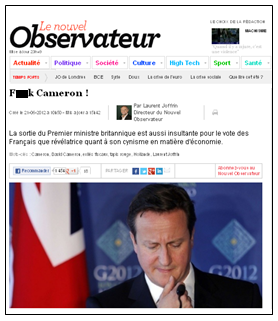Originally published in Investor’s Business Daily.

“I think it’s wrong to have a completely uncompetitive top rate of tax,” Cameron said. “If the French go ahead with a 75 percent top rate of tax we will roll out the red carpet and welcome more French businesses to Britain.”
The French were, as the expression goes, très en colère at such a prospect. “F–k Cameron,” blared the headline of Le Nouvel Observateur, the country’s largest news magazine.
“By transforming his country into a tax haven, Cameron is trying to attract all of those who have no civility whatsoever and who would gladly expatriate themselves if it meant saving a few million,” the paper’s editor-in-chief lamented.
First of all, this cross-Channel dust-up has very little to do with Britain becoming a “tax haven” (Cameron’s country is lowering its top income tax rate from 50 to 45 percent next year — hardly “haven” levels). Instead, it’s about France becoming what one entrepreneur called “the most taxed country in the world.” It’s also about what will happen when what’s left of the French private sector (government expenditures are already responsible for 56 percent of the nation’s GDP) is subjected to such an all-out assault.
Honestly, what do French critics expect Cameron to do in this situation? Turn back a cresting wave of new investment, jobs and tax revenue at a time when the European economy is clearly on the verge of yet another full-blown recession? He’d be tarred and feathered for even trying.
Nonetheless the architect of France’s latest (and greatest) adventure in socialism — newly elected president François Hollande — made it clear that he was also miffed by Cameron’s remark.
“Everyone should take responsibility for what he says. I do,” Hollande responded tersely when asked about Cameron’s comment. “At a time when European solidarity should be strong, I will do nothing to breach it.”
Of course Hollande did just that weeks later by snubbing Cameron and extending the first British diplomatic invite to his Élysée Palace to Labour Party leader Ed Miliband.
French snootiness, anger and vindictiveness aside, the fact remains that a sizeable portion of the nation’s assets will soon be headed to England (and Ireland, Monaco, Switzerland, etc.) whether Hollande and his socialist allies like it or not — and whether Cameron rolls out the red carpet or not.
“A large number of wealthy French families are leaving the country as a direct result of the proposals of the new government,” a French real estate agent told The (U.K.) Telegraph.
But it’s not just rich families pulling up stakes and heading to more hospitable economic climates. French companies like Dior, Givenchy, and Peugeot are also reportedly considering a leap across the Channel in order to stay afloat.
Why? Because Hollande’s government is doing much more than just hiking taxes on upper income earners. It is also imposing what’s know as a contribution exceptionnelle sur la fortune – a new tax on wealth that will double the burden for French citizens with assets in excess of €4 million. The death tax in France is also on the way up again – as is the top marginal rate on non-wealthy French taxpayers (i.e. those earning more than €72,000 a year).
Businesses large and small are about to feel the burn, too. Not only is the minimum wage in France being raised (above inflation, it’s worth noting), but Hollande is proposing a new three percent dividend tax on corporations – while forcing larger companies to speed up their tax payment schedules. New taxes on energy providers and financial transactions are also in the works – as is a reinstatement of the tax on overtime hours.
Why do overtime hours matter in France? Because the last time the socialists were in power they chopped the French workweek down to 35 hours – forcing conservatives to roll back income taxes on those hours in an effort to ramp up economic output.
Obviously Hollande isn’t going to end this benefit. In fact he wants French employees to work even less, which is why he’s proposing to reduce France’s already ridiculously low 62-year-old retirement age by two years.
Is any of this sustainable? Of course not. Hollande’s policies are beyond inadvisable in the best of economic circumstances – and positively suicidal given the nation’s flagging growth and the rampant instability of the Eurozone. And while the stated goal of these tax hikes is to lower France’s soaring deficits (a noble goal), one would think a government that’s eclipsed the size of the private sector could find some room to cut back somewhere.
Apparently not – which is why France is about to learn the hard way what bleeding the rich and attacking corporations means to an economy that’s already teetering on the brink.
The author is chairman of Americans for Limited Government.






